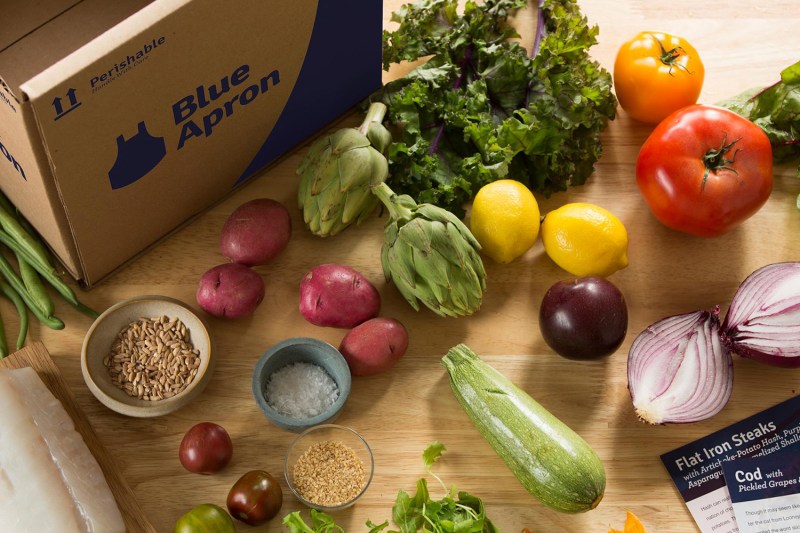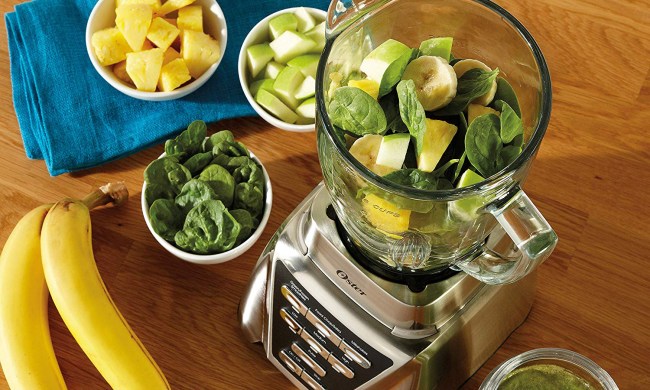
Plenty of meal kit delivery services are available online. If you love to cook, but you don’t really know where to begin and you could do with some inspiration, Blue Apron and Home Chef are likely to look very appealing. Both are popular names in the meal kit delivery world, you might not be sure how to differentiate the two and weigh up which one is best. That’s why we’ve taken a deep dive into what to expect from both meal kit services. Read on while we take you through everything you need to know from how easy they are to use, how interesting and creative their recipes are, and how much you should expect to pay for each service. By the end, you should have an idea of which meal kit delivery service is best for you and your family.
Ease of Use
Potentially, ease of use is the main reason why you’re even considering a meal kit delivery service. After all, you’re looking for the best in convenience so you can eat well with the least amount of trouble for yourself. Both Blue Apron and Home Chef are very good at focusing on convenience and saving you the effort to plan ahead for yourself or head to the store to buy a plethora of meal ingredients. Meal kit delivery services like these are typically designed to be something that involves less effort than entirely cooking from scratch while also being better for you (and tastier) than buying takeout food all the time. That’s why both services are so easy to sign up for. It takes mere seconds to sign up on each site. Both services deliver to the continental U.S. states excluding Hawaii and Alaska and they both let you choose a delivery day based on your zip code. If you have a busy lifestyle, you’ll be able to fit these services in fairly easily.
Signing up for Blue Apron starts out with you entering your email address and a password. From there, you can pick out what kind of plan you would benefit most from. Blue Apron offers the choice of picking out meals for either two or four people. Once you’ve figured that out, you can choose between two, three, or four recipes per week, so there’s some flexibility in what you want to do for food the rest of the week. There are three preferences to choose from. These include Signature, Wellness, and Vegetarian, and we’ll go into a much deeper look into those later. To sum it up quickly, Signature is the all-rounder package, which is great for omnivores with no dietary preferences. Alternatively, Wellness focuses on carb-conscious and WW-recommended meals for people looking to eat better, while Vegetarian — you guessed it — offers up meat-free dishes. It’s possible to change plans later on but starting out, you simply move on to entering your payment details and delivery information. Then, you can start adding meals. Blue Apron lays everything out clearly so you know exactly what to expect when it comes to payments each week, as well as know what food you’ll be receiving for the week too.
Home Chef
Both services pack food very carefully. Blue Apron aims to offer mostly recyclable materials but you will need to spend some time separating them. Home Chef also uses mostly recyclable or reusable packaging but typically offers even more packaging which may put off eco-conscious users. Ice packs can be fairly substantial in number for both services, but that’s pretty standard for any meal kit delivery service as no one wants spoiled meat.
When it comes to making changes or canceling something, both Blue Apron and Home Chef are pretty good. You can change delivery days if needed, along with the plan you’re signed up for. As with all meal delivery services, there are cutoff dates but other than that, it’s fairly simple to skip weeks, or even change the delivery address for individual deliveries. Blue Apron delivers every day of the week while Home Chef delivers Monday, Wednesday, Thursday, and Friday. Also, look out for Blue Apron only offering weekly deliveries as standard while Home Chef allows you to set up biweekly or even monthly schedules for occasional treats. Depending on how you plan on using your meal delivery service, there are pros and cons to both methods.
Winner: Draw
Recipe Creativity and Ingredients Quality
Even if a meal kit delivery service was incredibly cheap or quick to set up, it wouldn’t matter if the meals it offered tasted awful or weren’t to your taste. In the case of Blue Apron and Home Chef, both offer varied choices so there’s something for almost everyone here. Food tastes are personal so we won’t pick out the best meals as it really comes down to what you enjoy eating. However, we will look at the variety and choices offered by both. Frequently, both services offer a great mixture of traditional flavors along with more international options or things you may not have experimented with before. Through both meal kit delivery services, you’re sure to find great burgers, pasta meals, along with more unusual options if you fancy trying something different. Neither really caters to any specific dietary requirements. Both services offer some vegetarian and pescatarian options, but the priority is on food for omnivores. Home Chef
Home Chef has three categories of meal kits, encompassing standard meals, 15-minute meals, and easy prep meals. Each week, you get to check out a new menu with the bulk of the options being standard kits with a handful of 15-minute or easy prep options. You can even pick out meals that simply need heating up if you don’t want to do any cooking. Blue Apron divides things up according to how many people you’re cooking for rather than speed. It also has butcher bundles which provide you with additional protein if you need it. Thanks to both services rotating their menus regularly, there’s always extensive variety but — again — mostly if you’re an omnivore with no dietary restrictions.
Home Chef offers up swaps on pretty much all dishes while Blue Apron limits this to a smaller number of meals. That may be because Blue Apron is typically a little more diverse with its ingredients while Home Chef keeps more tightly to home cooking needs. Thanks to it being more diverse, Blue Apron also tends to involve some more effort compared to Home Chef’s simplicity. That can vary depending on what you choose to prepare though. Blue Apron offers up recipe-specific videos to help walk you through how to prepare things that require specific methods which helps out, even if you’re relatively new to cooking from scratch. Both come with recipe cards that are fairly straightforward to read through and understand. Home Chef encourages you to recreate dishes on your own too with a shopping list feature on its app so you can easily make a meal long after you’ve tried it through the service.
When it comes to ingredient quality, both Blue Apron and Home Chef offer fresh cold meat and seafood. Vegetables are frequently in good condition and ready to slice and dice as needed. Spices and other additives are measured out so you don’t need to do anything extra here, with salt often quite a key part of both companies’ cooking methods. Blue Apron focuses on having only certified non-GMO ingredients. Home Chef only uses farms that offer animal welfare standards but it’s not quite as good as dodging GMO ingredients. However, it has partnered with well-known quality producers like Paysan Breton Butter, as well as working to provide customers with sustainably sourced seafood.
Winner: Draw
Meal Kit Pricing
Pricing for Blue Apron and Home Chef vary substantially depending on your needs. Basically, the more meals you get from the service each week, and for more people, the better value the cost becomes. As with most subscription services, the best value comes from committing to the most expensive packages. With Blue Apron, it’s possible to sign up to cook for either two or four people. From there, you can choose to cook two, three, or four recipes each week with the service. If you decide to cook for just two people only twice per week, the cost per serving is $10 with shipping also costing $10. Better value is when you cook for four people with the price dropping to $9 per serving. Alternatively, if you want more
In comparison, Home Chef
Both companies offer some add-ons which can increase the price further. Blue Apron offers a wine pairing subscription that provides you with six 500ml bottles of wine each month for around $66. Each bottle is paired with your menu selection so you get the ideal glass of wine with your evening meal. Home Chef offers protein packs, bread, dessert, and some items as part of the Kroger grocery distribution network. It’s less personal than the Blue Apron method but can be useful at times.
Winner: Blue Apron
Blue Apron vs Home Chef — The Verdict
Both Blue Apron and Home Chef are good options if you’re keen to cook without having to shop quite so often or think about what you want to prepare. Each week, you can check out their sites and pick out appealing recipes, safe in the knowledge that fresh ingredients will arrive on your doorstep, saving you the need to go shopping yourself. Neither service offers a great amount of choice for people who eat specific diets, but if you and your family are made up of omnivores, there are plenty of options here. Some vegetarian options mean you can always choose to go meat-free once a week but don’t count on there being extensive support for allergen-free
Despite that, both services are fairly well suited for novice cooks. Home Chef is simpler to prepare thanks to it offering quicker meal options and focusing on more traditional meals, If you’re in a rush, Home Chef
Home Chef works out cheaper for smaller orders if you’re a couple looking to try out only a couple of recipes each week, even though you might find the
Ultimately, there’s no straightforward solution here. It all depends on the kind of food you like and how much effort you want to cook into preparation. If you’re keen to put some effort into cooking but you’re not sure where to start, Blue Apron is a good bet. It offers some great and unique recipes that will stand out while not being too difficult to prepare. However, if you want to cut back on prep as much as possible or you have some picky eaters at home then Home Chef is a better option as it’s sure to have plenty of traditional favorites to keep everyone happy.
Whatever you choose, neither is excessively complicated to figure out, from signing up to actually cooking. Both provide you with high-end ingredients with some pros and cons on either side. If you can, try them both out to see what works best for you and your family. It’s likely you’ll find a lot to love about them both.



